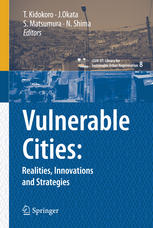

Most ebook files are in PDF format, so you can easily read them using various software such as Foxit Reader or directly on the Google Chrome browser.
Some ebook files are released by publishers in other formats such as .awz, .mobi, .epub, .fb2, etc. You may need to install specific software to read these formats on mobile/PC, such as Calibre.
Please read the tutorial at this link: https://ebookbell.com/faq
We offer FREE conversion to the popular formats you request; however, this may take some time. Therefore, right after payment, please email us, and we will try to provide the service as quickly as possible.
For some exceptional file formats or broken links (if any), please refrain from opening any disputes. Instead, email us first, and we will try to assist within a maximum of 6 hours.
EbookBell Team

4.4
62 reviewsAll cities are vulnerable. They have economically, socially, institutionally vulnerable urban space.
In developing countries, vulnerable urban space can be observed typically as substandard informal settlements such as slums or areas occupied by squatters. At present, slum dwellers comprise one-third of the world's urban population of 3 billion, and it has been estimated that the number of slum dwellers will double in the next 30 years if no effective action is taken. Improvement of vulnerable urban areas, which is one of the targets of Millennium Development Goals, is thus an urgent worldwide challenge in our age.
This book combines empirical and comparative analysis of improvement of vulnerable urban space and post-disaster rehabilitation in Asian and Latin American countries. The discussions presented herein will serve as a useful, thought-provoking source for researchers, practitioners and students, especially for those who are working to alleviate the vulnerability of urban space.